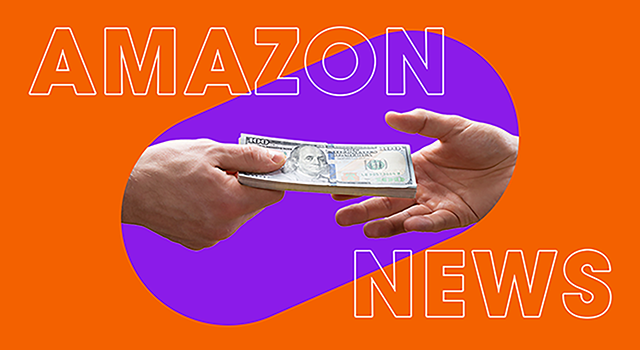BIG IDEA
Many technological innovations exist to make the life of an entrepreneur easier. Fortunately for Amazon sellers, AI is one of them. A seller took the discussion to Reddit providing tips on how to leverage ChatGPT, a powerful AI bot that engages in human-like conversations.
🤖 Here are some of the suggestions:
- Generate replies
In customer service, it's important to be friendly while holding a professional tone. Maintaining this balance in your responses can be difficult at times, but having AI can help you pull it off with ease. Specify whatever you're trying to accomplish, and let AI handle the rest!
- Address competitors' weaknesses
Want to stand out on Amazon? Be better than everyone else. Scour competitor's reviews using ChatGPT and have them summarized. With this, you could easily create benefit statements per negative review to use and help gain you the advantage.
- Write product listings
Product listings are the backbone of your Amazon business. It only makes sense that you have the perfect copy to encourage customers to buy from you.
- Come up with product ideas
Although it isn't yet possible for this AI to conduct product research, you can prompt it with specific inputs to help you in your research process. This is perfect if you're looking for a new niche to explore and need to get the ideas rolling.
- Draft contracts
Use ChatGPT to help with administrative tasks like drafting contracts for your employees, influencers, and service providers. It may not have that touch of professionalism quite yet, but it could be a foundation for what you need.
🪝 What's the catch?
- It's still an AI and you're not the only one using it. Other sellers using it might produce similar content as yours.
- The outputs aren't perfect. You should always perform a final review and edit to your liking.
AIs are bots that were created by humans. While you can save a lot of time with their efficiency, use it wisely and you can achieve some pretty amazing results.

AMAZON NEWS
Sellers responsible for carrier shipping correction charges

Starting January 14, sellers will be responsible for any carrier shipping correction charges on customer returns of seller-fulfilled orders caused by incorrect return label information.
In an article from EcommerceBytes, many expressed their dismay towards the announcement, stating how unlikely it is for customers to reuse the same packaging for their returns.
“It is infuriating that Amazon will not simply deduct the cost of extra size package from the customer refund. By doing so, sure it would make customers mad at first, however it would retrain them to not be abusive and be respective of the returns process. Amazon customers must un-learn the bad habits Amazon instilled in them.”
🗣️ The retail giant’s stand
Amazon will credit sellers in cases wherein the package is smaller than it should be, but their best bet is to set the correct product dimension, weight, and return address on their listings to help manage these issues.

BITES OF THE WEEK
- What to sell on Amazon FBA in Q1 2023 - JungleScout
- 8 Customer Service Channels for Ecommerce - PracticalEcommerce
- A-to-z appeal denied with proof of signature! - Seller Central
- Charts: U.S. Retail Ecommerce Sales Q3 2022 - PracticalEcommerce

TRENDING TOPIC
Amazon won’t reimburse 30k worth of missing items

A seller aired their disappointment on Seller Forums about their lost FBA shipment and Amazon’s reluctance to deliver the proper reimbursement. The seller had a shipment sent to the FBA fulfillment center in August using an Amazon-partnered carrier, but it never checked in.
💰The plot thickens
- This seller opened a reimbursement case in October with their signed BOL and invoice for their items.
- Amazon advised them to wait until the shipment was eligible for reconciliation.
- The seller clarified that there would be no date set for reconciliation since their products never reached the fulfillment center.
- Using the information on the delivery documents provided by the seller, Amazon didn’t find any records that they received their items. The email also noted that the seller is not eligible for reimbursement as their claim doesn’t meet the requirements.
What’s unfortunate is that this isn’t just an isolated case, sellers experience this regularly. Although some are lucky enough to have this resolved, many never see their shipment again.
Final takeaway? Persistence is key, especially when dealing with Amazon for reimbursements.

ACTIONABLE ADVICE
Understanding product ASINs

With millions of products on Amazon, reliable modes of tracking and identification are critical. ASIN, short for Amazon Standard Identification Number, is more than just a cluster of letters and numbers. It's your product's identity or permanent address on Amazon. Each product is automatically assigned a unique identifier that consists of 10 characters.
🔢 What are ASINs used for:
- Track items on Amazon's website
- Locate items in warehouses
- Monitor picking and shipping of orders
- Enable sellers and buyers to find the exact items
🔍 How to identify a product's ASIN?
- Your product listing's web address
- The product's detail page
- Seller ASIN lookup software
Create a new ASIN or use an existing one?
- Using an existing ASIN: Check if an ASIN for your item already exists. Use it if it matches your item. This is typically the route of resellers or retailers.
- Creating a new ASIN: If an ASIN for your product doesn't exist yet, create a new product on Amazon's catalog. This is typically the route of brands and private label owners.








